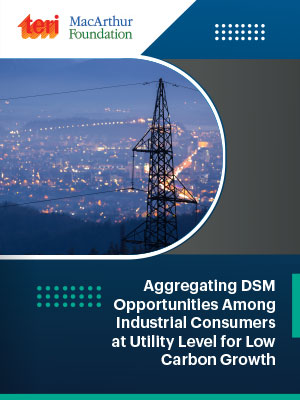Assessment for aggregating DSM opportunities at utility level amongst industrial consumers for low carbon growth
There are several energy-efficient (EE) technologies that can be adopted by industrial consumers to save energy and reduce their electricity demand. Demand aggregation is a critical step in the development of a utility's Demand Side Management (DSM) program. Extrapolation of the results of the sample survey conducted among 100 SME customers of Tata Power was conducted to estimate the aggregated demand for EE technologies (EET) in the entire population.
The aggregation exercise is helpful in estimating the cumulative quantity of these EE technologies that can be purchased or procured in bulk by the utility, so that thier cost can be brought down through economies of scale. An innovative business model for utility managed DSM program was drawn up, in two variants, for large-scale adoption of five EETs identified under the study. Both variants of the business model are designed to operate around the broad principles of an Energy Services Company (ESCO), and address all the key expectations and concerns of the primary stakeholders in regard to the financing, procurement, installation and use of the EETs. Two awareness events, in Delhi and Mumbai were organised under the project.
Aggregating DSM Opportunities among Industrial Consumers at Utility Level for Low Carbon Growth
Recognizing the enormous potential for bringing about energy efficiency improvements among MSMEs through DSM, TERI, with support from MacArthur Foundation, undertook a project to study and assess, in more detail: energy-efficient technologies (EETs) options in MSME consumers; scope to ‘bundle’ these EETs (demand aggregation) to make them attractive business propositions for technology suppliers and utilities; and viable, mutually beneficial business model(s) that DISCOMs could implement under DSM programs, to promote the large-scale adoption of EETs among industrial consumers.
Under the study, TERI forged a partnership with the largest private sector power utility, Tata Power. Unit-level energy assessment studies in 100 industrial consumers of Tata Power were conducted to understand the energy consumption pattern, technology in use, and operational practices. This report covers the approach and methodology adopted for the study, key findings, and recommendations for further action.


